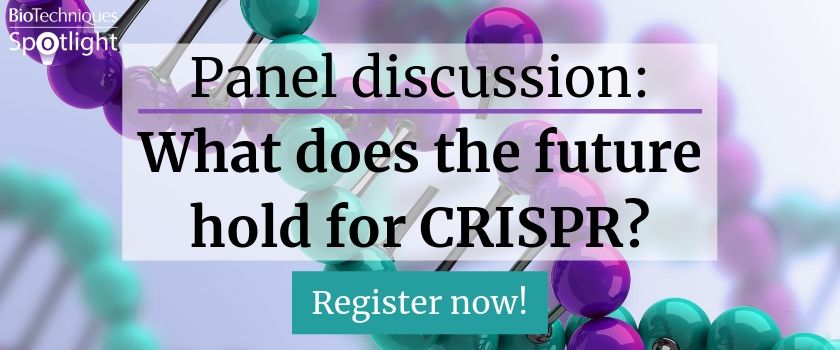Panel discussion: What does the future hold for CRISPR?

CRISPR has demonstrated its ability to edit DNA in bacteria, viruses, plants and human cells. It is proving itself to have many advantages over other gene editing techniques, including its simplicity, efficiency, easy customization of target DNA and the ability to target multiple genes simultaneously. Novel CRISPR systems and applications are continuously being developed, so its potential is ever-growing.
However, CRISPR is not currently perfect and does not come without its concerns. CRISPR can often affect regions of DNA outside of its target, hence continuous evaluation and technique development is necessary. Therefore, there are also huge ethical issues with utilizing CRISPR editing on humans, on top of the question of whether gene editing on humans is moral in the first place.
In this free panel discussion, our experts will discuss the latest developments and challenges with using CRISPR and what the future holds for the much-discussed technique.
What will you learn?
- Best practice when utilizing CRISPR
- The current key challenges in CRISPR use
- What’s on the horizon for CRISPR
Speakers

Lecturer in Reproductive and Molecular Genetics
UCL (London)
Helen is a molecular geneticist and Director for the MSc in Reproductive Science and Women’s Health Programme at the Institute for Women’s Health, University College London (UCL). Her research team focusses on preimplantation embryo development and the use of CRISPR genome editing to assess understanding and treatment of disorders of infertility. She is using Machine Learning to assess CRISPR-mediated mosaicism in early embryos. Helen has an honours degree in Genetics, a Masters in Prenatal Genetics and Fetal Medicine from UCL and did her PhD and postdoctoral research in the Department of Stem Cell Biology and Developmental Genetics at the National Institute for Medical Research.
She lectures both masters and medical students and is active in public engagement involving women’s health.

Group Leader and Head of the Transgenesis Facility
ANU College of Health and Medicine (Australia)
Gaetan is a geneticist and Group leader at The John Curtin School of Medical Research (JCSMR) at the Australian National University (ANU, Australia). He was born in France and completed his education in Paris. He graduated in 2002 with a Medical Doctor Degree and completed his PhD in 2008 from Pasteur Institute and the Museum National of Natural History (both Paris, France). He migrated to Australia as a postdoctoral researcher at the University of Tasmania from 2008 to 2012 and Macquarie University in Sydney (both Australia) from 2012 to 2015. In 2015 he was appointed as a group leader at the JCSMR and leads a research program on the development of CRISPR/Cas9 gene editing technology and the pathogenesis of multidrug resistant bacteria

Research Fellow
University of Oxford (UK)
Jonathan is a Postdoctoral Research Fellow in Applied Moral Philosophy at The University of Oxford, and Manager of Visitors Programmes for the Oxford Uehiro Centre. He is currently leading a Wellcome Trust-funded project entitled “The Ethics of Novel Therapeutic Applications of Deep Brain Stimulation”. His research interests lie primarily in issues concerning personal autonomy in practical ethics, particularly topics pertaining to informed consent. He has also written on the ethics of human embryonic stem cell research, criminal justice, human enhancement, and gene-editing.
This webinar was recorded on 11th July 2019
